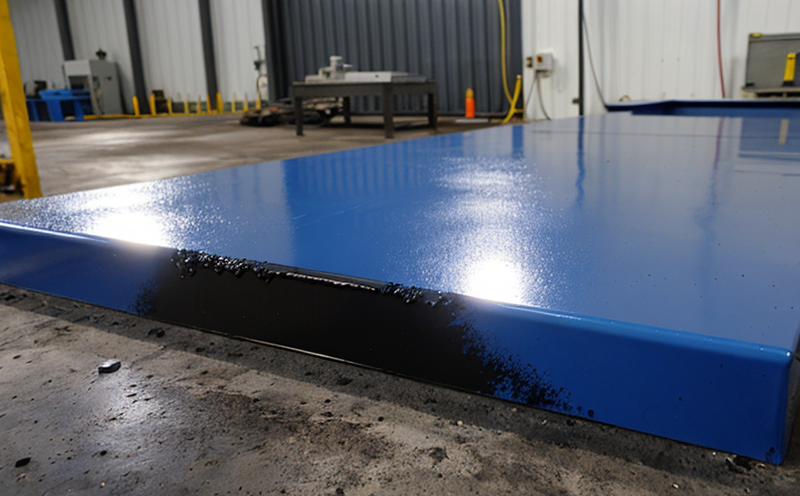ASTM D2197 Scrape Adhesion Testing of Organic Coatings
The ASTM D2197 standard is a widely recognized and extensively utilized method that evaluates the adhesion strength between an organic coating and its substrate. This test is crucial for ensuring the durability, reliability, and performance of coated surfaces in various industrial applications. The primary goal of this testing procedure is to determine how well the coating can resist forces that would cause it to peel or flake off from the surface beneath.
The ASTM D2197 scrape adhesion test is particularly important for industries such as automotive, aerospace, marine, and construction, where surfaces are regularly exposed to harsh environmental conditions. In these sectors, maintaining a strong bond between the coating and substrate can significantly enhance the lifespan of the product and reduce maintenance costs.
The testing process involves applying a known force perpendicular to the coated surface using a standard instrumented blade. The force is gradually increased until the coating begins to peel away from the substrate. At this point, the test measures both the maximum force required to initiate peeling and the area of the peeled region. These parameters provide valuable insights into the cohesive strength of the coating and its adhesion properties.
The results of ASTM D2197 testing are often used as a critical quality assurance measure during product development, manufacturing, and compliance verification. For instance, in R&D environments, these tests help refine formulas and improve coatings to meet specific performance criteria. In procurement processes, the test data ensures that suppliers deliver materials meeting stringent adhesion standards.
The ASTM D2197 method is also essential for regulatory compliance, particularly in regions where coating specifications are strictly defined by international or national regulations. By adhering to this standard, organizations can ensure their products meet all relevant legal requirements and industry expectations.
Understanding the principles behind ASTM D2197 helps stakeholders appreciate its significance in protecting coatings from environmental factors like humidity, temperature fluctuations, abrasion, and chemical exposure. A well-adhered coating is more resistant to these elements, thus enhancing product longevity and performance. This testing ensures that coatings used in critical applications can withstand real-world conditions without compromising safety or functionality.
For industries relying on surface protection, the ASTM D2197 scrape adhesion test plays a pivotal role in quality assurance and compliance. By implementing this standardized method, manufacturers can enhance their product reliability and maintain high standards of performance across diverse environments.
Why It Matters
The importance of ASTM D2197 testing cannot be overstated, especially for industries that heavily rely on coated surfaces. This test provides a critical evaluation of the durability and adhesion strength of coatings, which are essential in ensuring product performance under various operational conditions.
- Enhances Product Reliability: By assessing coating adherence, this method ensures products can withstand harsh environmental factors like humidity, temperature fluctuations, abrasion, and chemical exposure.
- Promotes Regulatory Compliance: Adherence to industry standards is crucial for meeting legal requirements in regions where coating specifications are strictly defined by regulations.
- Supports Quality Assurance: In R&D environments, the test helps refine formulas and improve coatings to meet specific performance criteria. This ensures that new products can consistently perform as expected.
- Facilitates Supplier Evaluation: ASTM D2197 results serve as a benchmark for evaluating coating suppliers, ensuring they deliver materials meeting stringent adhesion standards.
The test's significance lies in its ability to provide actionable insights into the performance and durability of coatings. By understanding these parameters, manufacturers can make informed decisions that lead to enhanced product reliability and compliance with industry and regulatory requirements.
Scope and Methodology
| Test Parameters | Description |
|---|---|
| Coating Material | The test applies to organic coatings such as paints, varnishes, enamels, and other similar materials. |
| Substrate Type | The substrate can be metal, wood, plastic, or any other material suitable for coating. |
| Force Application | A standard instrumented blade applies a force perpendicular to the coated surface. The force is gradually increased until the coating begins to peel away from the substrate. |
| Peeled Area Measurement | The area of the peeled region is measured using calibrated instruments, providing detailed insights into the adhesion quality. |
| Test Conditions | Description |
|---|---|
| Temperature and Humidity | The test is conducted under controlled conditions to ensure consistent results. Typically, the temperature ranges from 23°C ± 2°C with a relative humidity of 50% ± 10%. |
| Specimen Preparation | Standardized procedures are followed for preparing the specimens. This includes cleaning and conditioning the substrate to ensure consistent results. |
| Instrumentation | The test utilizes a standard instrumented blade, which provides precise force measurements during the peel process. |
| Data Analysis | Results are analyzed for both maximum force and peeled area. These parameters provide comprehensive insights into coating adhesion strength and performance. |
The ASTM D2197 test is a robust method that ensures consistent and reliable evaluation of organic coatings' adhesion properties. By adhering to this standard, organizations can ensure their products meet all relevant quality and regulatory requirements.
Customer Impact and Satisfaction
- Enhanced Product Performance: Customers benefit from more durable and reliable coated surfaces that perform well under various conditions.
- Cost Reduction: Strong adhesion reduces the need for frequent maintenance or replacement of products, leading to cost savings over time.
- Regulatory Compliance: By adhering to industry standards like ASTM D2197, customers ensure their products meet all relevant legal requirements and industry expectations.
- Informed Decision-Making: The test provides valuable data that helps stakeholders make informed decisions regarding product development, quality assurance, and supplier evaluation.
The results of the ASTM D2197 scrape adhesion test are instrumental in ensuring products meet high standards of performance. This not only enhances customer satisfaction but also builds trust between suppliers and their clients.





